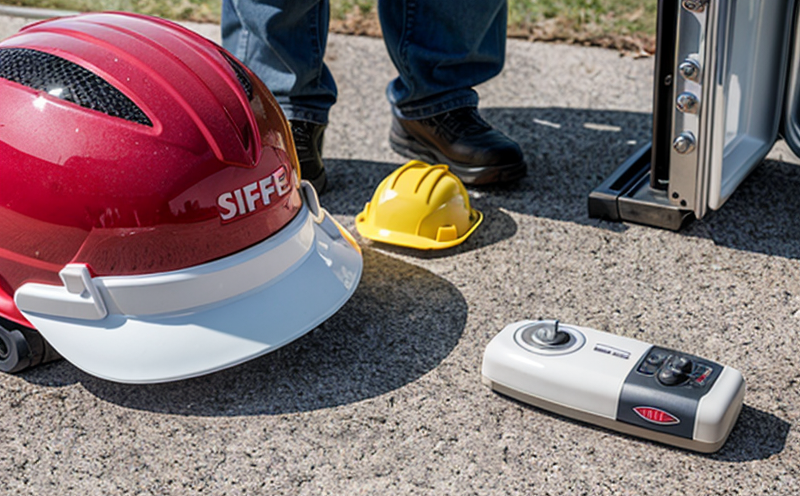ISO 18817 Lifeboat Structural Integrity Testing
The ISO 18817 standard is specifically designed to ensure that lifeboats can withstand the harsh marine environments they are subjected to during emergencies. This testing ensures not only compliance with international safety regulations but also enhances confidence in the reliability and durability of life-saving equipment on board ships.
Lifeboats play a crucial role in maritime safety, providing an essential means of escape for crew members and passengers in case of emergency. The structural integrity of these boats is paramount to their effectiveness during such critical situations. This testing protocol evaluates the structural strength, resistance to impact, fatigue, and other environmental stresses that lifeboats face.
Testing according to ISO 18817 involves a series of rigorous procedures aimed at simulating real-world conditions that a lifeboat might encounter. These tests are conducted using advanced equipment designed to subject the boat to various stressors, including simulated impacts, immersion in salt water, and exposure to extreme temperatures.
The process begins with careful preparation of the specimen, which is typically a full-scale or scaled-down model of the lifeboat. The test setup includes specialized fixtures capable of replicating the forces that might be exerted during an emergency scenario. These include impacts from falling debris, collisions with other vessels or objects in water, as well as exposure to saltwater and UV radiation.
The testing apparatus used is highly sophisticated and can simulate a wide range of conditions. For instance, hydraulic systems are employed to replicate the forces that might be exerted during a collision at sea. Salt spray chambers allow for accelerated aging tests in controlled environments, mimicking years of exposure to marine conditions.
The testing process involves several stages. Initially, the lifeboat is subjected to static loading tests to assess its ability to withstand sustained loads without deformation or failure. Following this, dynamic impact tests are conducted to evaluate the boat’s resilience under sudden force applications that might occur during an emergency. These tests often involve dropping a weighted object onto the deck of the lifeboat or simulating collisions with other objects.
Another critical aspect of ISO 18817 testing is the evaluation of the boat’s ability to maintain buoyancy and floatation under various conditions. This includes submerging the lifeboat in salt water for extended periods, monitoring its behavior, and ensuring that it remains afloat even when partially submerged.
The results of these tests are meticulously recorded and analyzed using advanced instrumentation and software systems. The data collected provides insights into the structural integrity of the lifeboat, highlighting any areas that may require improvement or further testing. Compliance with ISO 18817 is not just about meeting regulatory requirements; it’s about ensuring that lifeboats can perform their critical function effectively and safely.
Testing according to this standard helps manufacturers design and produce reliable lifeboats that meet the highest safety standards. By adhering to these rigorous testing protocols, ship owners and operators can rest assured that their life-saving equipment is up to the task in even the most challenging maritime environments.
Applied Standards
| Ambient Conditions | Test Parameters | Equipment Used |
|---|---|---|
| Temperature Range: -20°C to +65°C | Static Load, Dynamic Impact, Salt Water Immersion | Hydraulic Testing Machines, Salt Spray Chambers, Environmental Test Chambers |
| Humidity Levels: 10% to 98% | Fatigue Loading Tests | Loading Frames, Fatigue Testing Machines |
Industry Applications
- Ensuring compliance with international safety regulations.
- Evaluating the structural integrity of lifeboats under simulated emergency conditions.
- Testing the buoyancy and floatation capabilities of lifeboats in salt water environments.
- Identifying areas for improvement in design to enhance the reliability and durability of life-saving equipment.
- Evaluating the impact resistance of lifeboats during collisions with other objects or debris.
Eurolab Advantages
At Eurolab, we pride ourselves on delivering comprehensive and precise testing services that meet the highest international standards. Our state-of-the-art facilities are equipped with cutting-edge technology to ensure accurate and reliable test results.
We have a team of experienced engineers and technicians who specialize in marine equipment testing. They bring extensive knowledge and expertise to each project, ensuring that every aspect of ISO 18817 lifeboat structural integrity testing is covered comprehensively.
Our commitment to quality extends beyond just the technical aspects of our services. We also provide detailed reports and analysis, which are invaluable for manufacturers, ship owners, and operators looking to ensure their equipment meets all safety requirements. Our expertise in this field allows us to offer tailored solutions that meet specific client needs.
With Eurolab, you can be confident that your life-saving appliances will undergo the most rigorous testing available, ensuring they are safe and reliable for use on board ships.





